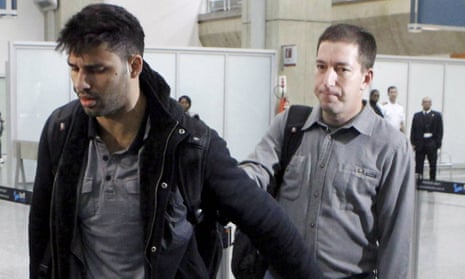David Miranda, the partner of the former Guardian journalist Glenn Greenwald, has launched a fresh appeal challenging the legality of his detention under counter-terrorism powers for nine hours at Heathrow airport in 2013.
The hearing at the court of appeal in London is an attempt to overturn an earlier decision by a lower court that holding him under schedule 7 of the Terrorism Act 2000 was lawful.
About 60,000 people a year are held in such controversial port stops. The Home Office has argued that border controls exist to check on travellers where there is insufficient information to justify an arrest.
Miranda’s first legal challenge was supported by the Guardian. This court of appeal challenge is funded by First Look Media, which publishes the online magazine the Intercept. The organisation said the appeal had been brought to defend freedom of expression and journalists’ rights.
When Miranda was stopped in August 2013, he was carrying encrypted files containing journalistic material derived from the US National Security Agency whistleblower Edward Snowden, his lawyer told the appeal court.
Matthew Ryder QC said: “Snowden, whatever you may think of him, provided information which has been of immense public importance. In this case we are talking about journalism of unusually high quality.”
The previous court had erred in its decision, Ryder said, because it had misinterpreted the law on proportionality and the detention was incompatible with Miranda’s rights to privacy and freedom of expression under the European convention on human rights.
Last year three high court judges dismissed the challenge brought by Miranda, accepting that his detention and the seizure of computer material was “an indirect interference with press freedom” but said this was justified by legitimate and “very pressing” interests of national security.
The three judges – Lord Justice Laws, Mr Justice Ouseley and Mr Justice Openshaw – concluded that Miranda’s detention at Heathrow was lawful, proportionate and did not breach European human rights protections of freedom of expression.
Miranda was stopped in transit between Berlin and Rio de Janeiro after meeting the film-maker Laura Poitras, who had been involved in making disclosures based on documents leaked by Snowden.
Miranda was carrying encrypted files, including an external hard drive containing 58,000 highly classified UK intelligence documents, “in order to assist the journalistic activity of Greenwald”. The Guardian made his travel reservations and paid for the trip.
The high court judgment said the seized material included personal information that would allow staff to be identified, including those deployed overseas.
The court of appeal was read a message sent on 16 August 2013 by MI5 to Det Supt Stockley of the Metropolitan police’s counter-terrorism command (SO15).
The memorandum was headed: “National security justification for proposed operational actions around … David Miranda”.
It said: “We strongly assess that Miranda is carrying items which will assist in Greenwald releasing more of the NSA and GCHQ material we judge to be in Greenwald’s possession … Our main objectives against David Miranda are to understand the nature of any material he is carrying, mitigate the risks to national security that this material poses.”
It added: “We are requesting that you exercise your powers to carry out a ports stop against David Miranda … There is a substantial risk that David Miranda holds material which would be severely damaging to UK national security interests. Snowden holds a large volume of GCHQ material, which, if released, would have serious consequences for GCHQ’s collection capabilities, as well as broader SIA operational activities.”
SIA is believed to be secret intelligence agents.
The following day, before Miranda arrived on 18 August, acting Det Insp Woodford at Heathrow was concerned that the port circulation sheet had not confirmed that a schedule 7 stop had been requested, the court was told.
Woodford was eventually sent further details and the port circulation sheet received had additions to its intelligence summary section. It stated: “We assess that Miranda is knowingly carrying material, the release if which would endanger people’s lives.”
Ryder told the court: “The Security Service purpose was not a schedule 7 purpose. Wanting to get material off somebody and no more is not a [legitimate] schedule 7 purpose.”
The focus of a schedule 7 port stop, he maintained, should be whether or not the person targeted is preparing acts of terrorism. If the law was interpreted as the high court decided, Ryder said it “would mean that terrorism could be committed by acts that do not intend to incite violence or endanger life”.
He added: “It would mean that terrorism can be committed by acts that are themselves entirely lawful and … can be entirely lawful.”
The case continues.
